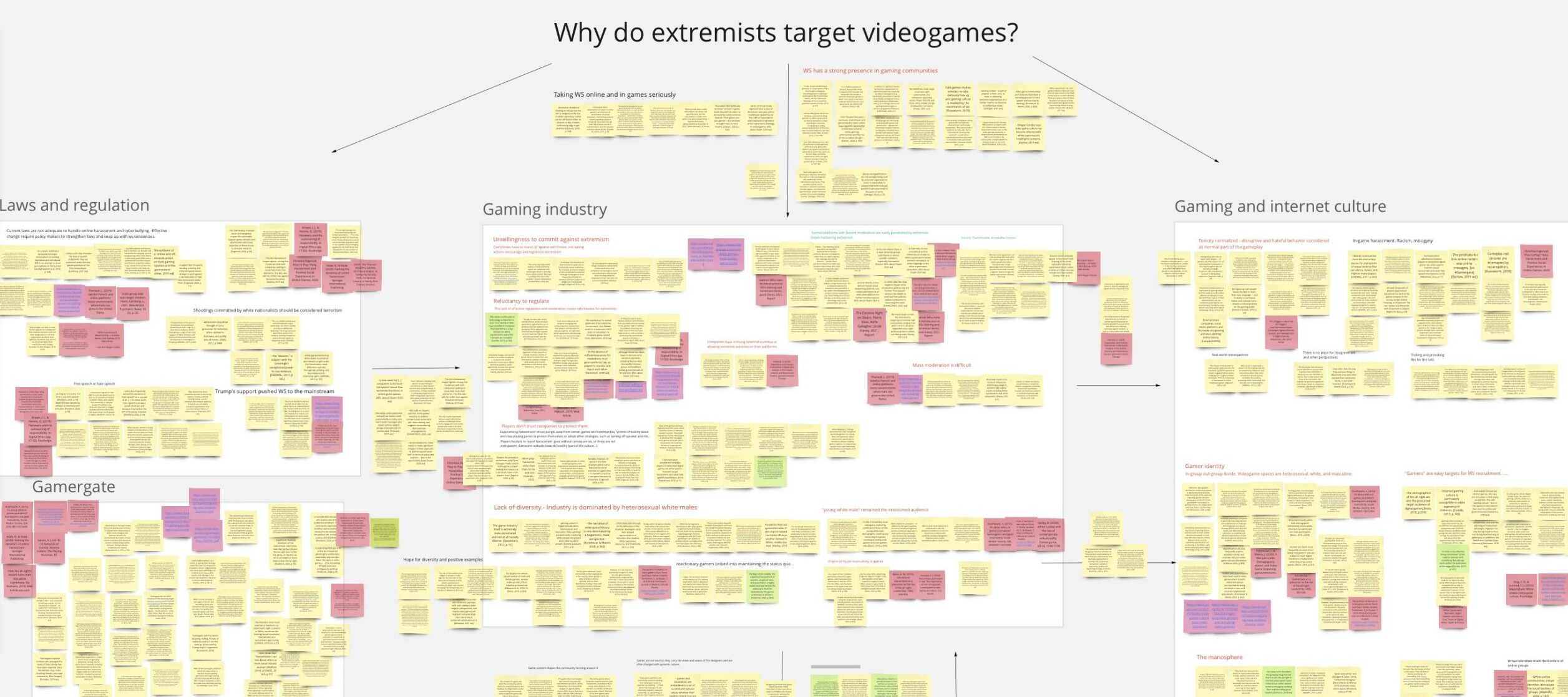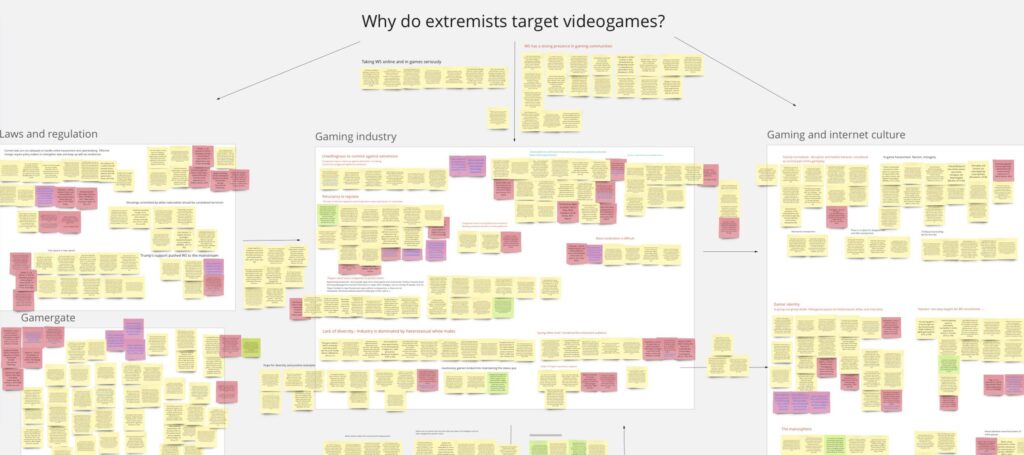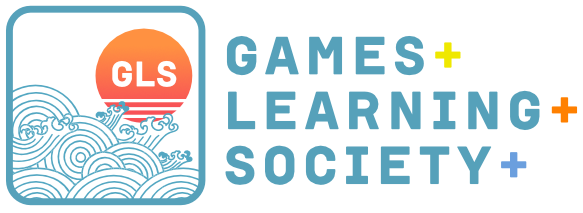Extremism in videogames
A systematic review of extant research on right-wing extremism and videogames
March 2021 - January 2022
A growing present of right-wing extremism in online game spaces is an increasing concern in the US today. Having a better understanding of how far-right actors operate in videogame platforms is vital in protecting players. To synthesize the state of existing research and identify future directions, we conducted a systematic literature review on right-wing extremism in videogames.
Contributions
Primary Role
From June 2021, I worked as the project lead
Responsibilities
- Study planning, formulate definitions, inclusion and exclusion criteria
- Identifying and gathering publications in several academic databases
- reading through the literature and conducting a thematic content analysis of the collected publications
- Organizing over 900 notes from the articles into themes and categories on a Miro board
- writing the paper for a peer reviewed academic journal: Games and Culture

Published article
Wells, G., Romhanyi, A., Reitman, J. G., Gardner, R., Squire, K., & Steinkuehler, C. (2023). Right-Wing Extremism in Mainstream Games: A Review of the Literature. Games and Culture. https://doi.org/10.1177/15554120231167214
Case Study
Background & motivation
Online hate, harassment, and a growing presence of right-wing extremism in online gaming spaces is an increasing concern in the US today. Having a better understanding of how far-right actors operate in videogame platforms, how they utilize these spaces to normalize hate, recruit members, strengthen their communities and increase loyalty are vital in protecting players.
To identify future research directions and recommendations for the games industry, we conducted a systematic literature review of existing academic research on right-wing extremism in videogames.
Collaborators
- Gary Wells
- Dr. Jason Reitman
- Reginald T. Gardner
- Dr. Kurt Squire
- Dr. Constance Steinkuehler

Data collection and analysis
We initiated the project by identifying and collecting relevant literature that fell within our leading definition of right-wing extremism and white supremacy.
This was a very manual process because extremism and white supremacy are used as keywords across academic databases to label topics outside of our scope. Searching through six academic databases, we collected 226 publications that fit our predefined inclusion criteria. The compiled literature spanned a wide range of research traditions and included different types of studies and journalism. To ensure consistency and order, we conducted a thematic content analysis on the research base and grouped common topics and traits into broader categories.
In a spreadsheet, we recorded primary information for each article, and extracted data relevant to our applied research method, question(s), findings or arguments, suggested future direction, and additional notes. All articles were then read by a minimum of two reviews to ensure no important details were overlooked. Last, we extracted talking points and arguments relevant to our research question and organized them in a meaningful and systemic way using a shared Miro board.
A large portion of the articles discussed video games as a media of communication and analyzed characters, narratives, and gameplay. Only a small selection of the literature was based on empirical work and studied players and their culture and communities pointing to a gap in extant research and an opportunity for future work.
Common claims found
- Gamergate is seen to be a turning point in hate-based online harassment and how far-right groups mobilize members and organize harassment campaigns. Right-wing extremists saw Gamergate as an opportunity to co-opt the erupting hate campaign. Harassment tactics of Gamergaters from the use of terms like “safe space” and “snowflake” for dismissing progressive views to increased incidents of doxxing, trolling, and overt threats of violence, are now routinely used by extremist groups online.
- While white supremacy traditionally originates in antisemitism and racism, the biggest traction of far-right ideologies in online gaming spaces appears to root in misogyny. The increasing female presence is seen as a threat to the traditional masculine gamer culture and identity making young white males prime targets of white supremacists. Blaming women for their perceived loss of privilege provides the most common starting point for radicalization and off-ramping to extremist ideologies.
- Right-wing extremist gamers inhabit the same online gaming spaces as millions of other players, providing ideal conditions for normalizing radical ideologies. Two of the most common strategies of these groups are filtering their beliefs through humor and using political dog whistles. Presenting their beliefs as jokes and memes, extremists hope to appeal to their young target audience. Disguising hate as trolling or sarcasm or wrapping it in coded language (dog whistles) allows them to sneak their ideologies past content moderators.
Recommendations for industry
Online games and gaming communities are appealing targets for right-wing extremist groups for intersecting reasons, many of which are related to pressing issues the games industry needs to face to cultivate healthy and thriving communities.
Increased diversity among industry professionals can reduce the reproduction of harmful stereotypes about what games are, who they are created by, and for what audience. Diversity and inclusion could help decrease the dominance of Western worldviews informing game design and development.
Tropes of settler colonialism, war-on-terror, America-firstism, and sexist or racist stereotypes soft-sell white supremacist ideologies, making it easy for extremists to appropriate games for their purposes. Forsaking such motifs would not only make mainstream games less appealing to right-wing extremists but would stop normalizing structural inequities and help prevent socializing into racism and misogyny.
Extremist rhetoric, even disguised as humor, needs to be distinguished from how we moderate trash talk, griefing, trolling, and average players having a bad day. We need better policies, player safety and governance tools to identify and de-platform white supremacists and stop them from spreading ideologies within our communities.
